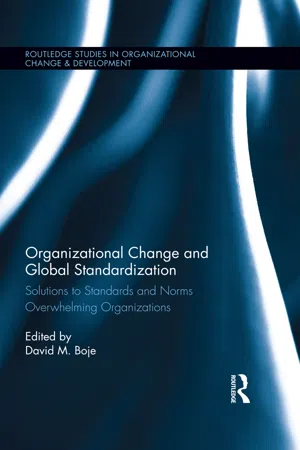
Organizational Change and Global Standardization
Solutions to Standards and Norms Overwhelming Organizations
- 276 pages
- English
- ePUB (mobile friendly)
- Available on iOS & Android
Organizational Change and Global Standardization
Solutions to Standards and Norms Overwhelming Organizations
About This Book
Organizational Change and Global Standardization: Solutions to Standards and Norms Overwhelming Organizations takes an organizational change approach to the overflow of standards and norms, looking at how to deal effectively and ethically with four kinds of standards and norms businesses face when they go global: (1) accounting & finance (2) international & world trade, (3) social and (4) safety & quality & environment. It is part of a larger problem faced by not only business, but every sort of organization - how to live with the epidemic of standards and norms, often in conflict, many just unnecessary, and a few that are quite helpful and important.
There are good reasons to have International Standards Organization (ISO), International Labor Organization (ILO), World Trade Organization (WTO), North Atlantic Treaty Association (NAFTA), International accounting Standards Boards (IASB), International Financial Reporting Standards (IFRS)), and many more standard-setting organizations issuing, auditing, proposing codes of ethics, and certifying standards and norms. However, there are important, poorly understood organizational change consequences to the contagion of standards and norms.
This volume brings together a unique group of authors who are working on a pragmatic way for organizations to deal with an overflow of standards and norms that are often at heads, ambiguous, or simply created to produce more work for a burgeoning standards setting industry. The aim of Organizational Change and Global Standardization is to stimulate a critical analysis within the framework of analytical and pragmatic approach to an overwhelming bureaucratization of the managed and organized global activities.
Frequently asked questions
Table of contents
- Cover
- Title
- Copyright
- Dedication
- Contents
- List of Figures
- List of Tables
- Preface
- Acknowledgments
- 1 Change Solutions to the Norms and Standards Overwhelming Organizations: An Introduction to “Fractal” Wings of “Tetranormalizing”
- 2 Philosophical Reflections on Tetranormalization
- PART I Economy/Accounting Change Fractals
- PART II Trade and Change Fractals
- PART III Social/Cultural Change Fractals
- PART IV Ecology/Quality Change Fractals
- Contributors
- Index